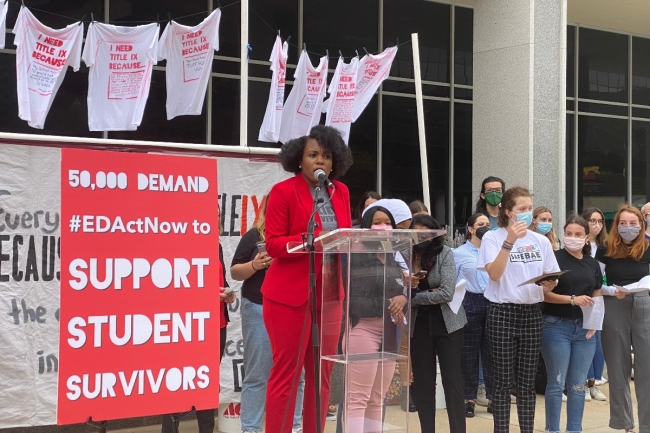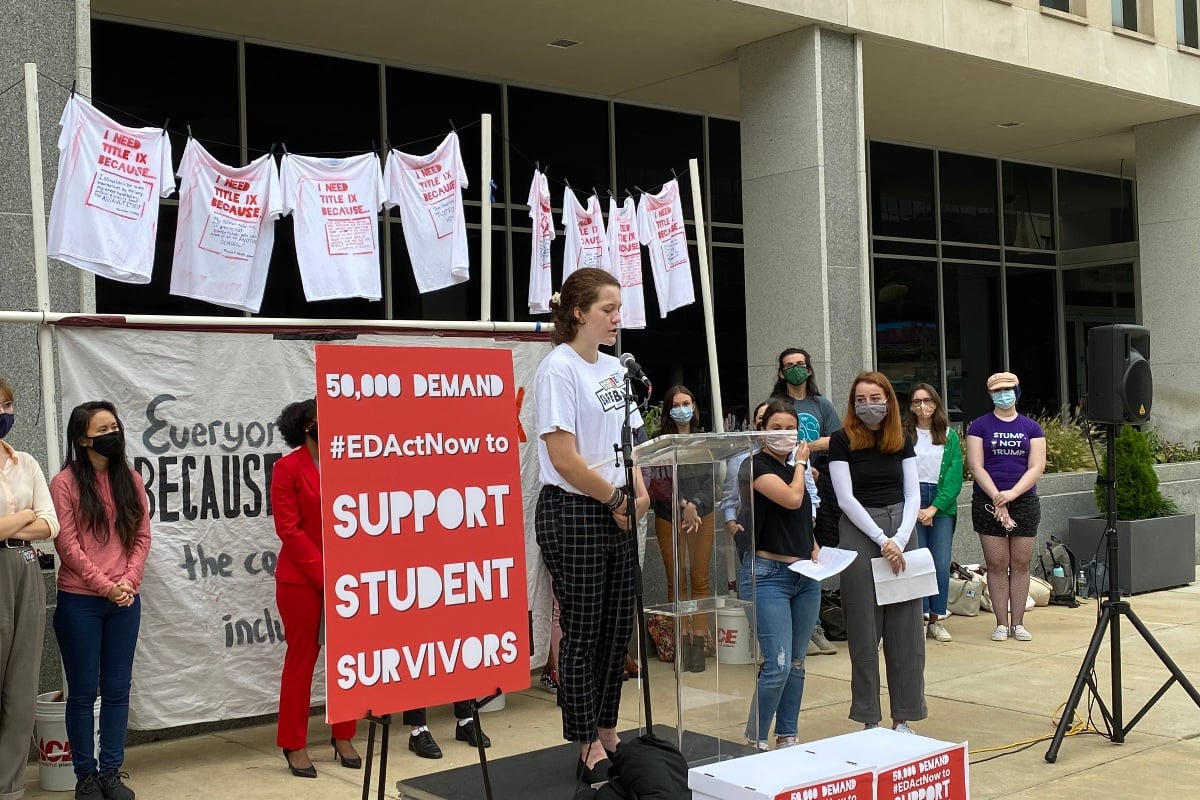You have /5 articles left.
Sign up for a free account or log in.

Kenyora Parham, executive director of End Rape on Campus, urged the Department of Education to meet the demands of ED Act Now.
Maria Carrasco/Inside Higher Ed
Students, sexual assault survivors and their advocates gathered outside the U.S. Department of Education Wednesday and delivered a petition with more than 50,000 signatures calling for an immediate rollback of Trump administration policies governing how colleges handle sexual misconduct on campus.
The ED Act Now petition calls on Secretary of Education Miguel Cardona and Acting Assistant Secretary of the Office for Civil Rights, Suzanne Goldberg to take three actions: to announce proposed changes to the Title IX rule by the end of October, to issue a nonenforcement directive on portions of former education secretary Betsy DeVos’s Title IX rule that narrow the scope of those protected by the law and to allow students to file complaints within 180 days from the most recent instance of discrimination instead of from the first instance.
President Biden issued an executive order in March asking the department to re-examine the current Title IX regulations. In June, the Department of Education announced it would propose Title IX rule changes next May. For advocates and survivors, that’s much too long of a wait.
The group that delivered the petition included members of the survivor support and advocacy groups End Rape on Campus, It’s On Us, Know Your IX, the National Women's Law Center, Equal Rights Advocates, the Every Voice Coalition and Girls Inc. They met with Goldberg and Cindy Marten, deputy secretary of education, but were upset when the officials said the department would stick with its plans to propose the rule changes in May 2022 without adopting the proposals requested in the petition. (This paragraph has been updated to include additional groups that were present.)
The push for the change comes with college students in the middle of the “red zone,” the time from the start of the fall semester through Thanksgiving break, when statistically more than 50 percent of all college sexual assaults occur. Students have already staged protests against sexual assault on multiple campuses across the country, including at the University of Kansas, Auburn University, the University of Massachusetts Amherst and others.
“We have seen thousands of students and advocates protest across the country, because they are fed up with the ways their campuses handle sexual assaults and the failure of people in power to hold perpetrators accountable and protect student survivors,” Kenyora Parham, executive director of End Rape on Campus, said at a rally after the meeting. “These protests help to hold colleges and universities accountable.”
Anissa Cartagena, a political science student at Delaware State University, spoke at the rally about her own assault in 2019, as well as assaults she’s heard about from other student survivors. She said she felt she had no choice but to attend the rally and speak out.
“I should be in class, not begging for basic civil rights,” Cartagena said. “But I can’t stand by anymore as I watch my university blatantly violate the rights of survivors.”
Cartagena said she had hoped the meeting with the Department of Education officials would be productive and ED Act Now’s demands would be met, but she was upset when they held their ground.
“The Department of Education had a decision to make here today, knowing that it will affect thousands of survivors, yet they chose the easy way out,” she said. “I am livid that the Department of Education is turning their back on survivors.”
Speaking about her own abuse, Cartagena said she faced retaliation not only from her abuser but from her university.
“Every semester, I have to fight for my right to stay in school,” she said during the rally. To help counter the lack of administrative support she felt, she founded Gracefully Igniting Voices Everywhere, a student-led organization at Delaware State dedicated to advocating for the prevention of and education about sexual assault.
“We are forced to be a safe haven for survivors because survivors do not trust the disruptive system we call Title IX,” Cartagena said. “Survivors are losing access to essential resources due to the failure of our Title IX office. This is pushing survivors out of school.”
Sage Carson, manager of Know Your IX, shared similar sentiments after the meeting, saying she had started out hopeful that the Department of Education would support the calls for reversing the Trump administration policies.
“Instead, the department shirked responsibility, turned it around to students and said, ‘Tell us what we can do to help you all prevent violence on your campus,’” Carson said. “And truthfully, this meeting was a waste of many of these survivors’ time who joined us to share their trauma, their stories and their urgency for these demands today.”

Lillian Frame, a student at American University and organizer for SafeBae, a survivor-founded and youth-led organization, said the words she heard most during the meeting were “urgent” and “priority,” yet the department failed to act that way. She asked how many months it had been since the Biden administration took office and how much longer it would take for the department to make changes.
“The decisions made here in this building don’t just affect college students, nor are they abstract concepts,” Frame said. “They’re life-altering and potentially life-ending.”
Part of a Larger Movement
Similar sentiments have been voiced at the demonstrations on college campuses.
At the University of Nebraska at Lincoln, thousands of students protested over multiple nights in front of the fraternity house of Phi Gamma Delta, commonly known as Fiji, after a reported assault by a fraternity member in August. According to the university communications office, a 19-year-old male member of Phi Gamma Delta is under investigation for allegedly assaulting a 17-year-old female student on Aug. 24, the second day of classes, BuzzFeed News reported.
Taylor Jarvis, internal vice president of the Association of Students of the University of Nebraska, attended the first protest, which she called “incredibly surreal.”
“I remember during that day, we were kind of hunkered down in the student government office trying to anticipate what it would look like, and we heard maybe there would be 60 people there,” Jarvis said. “And then there were hundreds of people there. Just watching folks continue to pour in, down the street towards the fraternity house, towards Fiji, that was involved in the incident, was incredibly powerful.”
Jarvis said news of the reported assault gained traction because the details floating around campus were graphic, violent and horrific. When word of the assault got out, Jarvis said, “It was both surprising and not surprising.”
Jarvis has since taken the lead within the student government on connecting and working with students, stakeholders and even Chancellor Ronnie Green on strengthening the university’s compliance with Title IX. Following the alleged assault, students pressured the administration into allocating more resources to help sexual assault survivors, Jarvis said.
Two weeks after the assault reportedly occurred, Green told leaders of UNL’s student government that the university would conduct in-person, peer-led sexual misconduct training for all students by the end of the spring 2022 semester. He also vowed to appoint a director of education on sexual misconduct to the Center for Advocacy Response and Education. And he said the university was considering adding additional mental health support and resources for students, the Lincoln Journal Star reported.
Jarvis hopes to continue pushing for change but said it can be difficult to do so with a topic that is so intense.
“Going forward, I think the key is just continuing to hold the administration’s feet to the fire on the issue,” Jarvis said. “And using the momentum that we have and taking advantage of it rather than just saying, well, ‘The protests have died down,’ ‘We got a couple of promises from the chancellor,’ ‘I think this is in a better place,’ because there are so many issues on campus that still need to be solved.”
The campus protests and the gathering at the Department of Education come as colleges scramble to educate students on sexual health and sexual assault prevention. With the return of so many new students to campuses -- including a large share of sophomores who attended remotely last year because of the COVID-19 pandemic -- experts worry about an increase in sexual assaults.
“When you’re combining two classes of students who are new to campus with returning juniors and seniors who are anxious to make up for lost time and party with friends, colleges are having that potential crisis of sexual assault on their hands due to what those environments or groups may create,” Parham, of End Rape on Campus, has said.
And that’s why it’s imperative for students that the Department of Education act on ED Act Now, Parham said during the rally.
“The Department of Education has an opportunity to protect them and fight for them,” Parham said. “And we hope that they will step up to do just that.”




